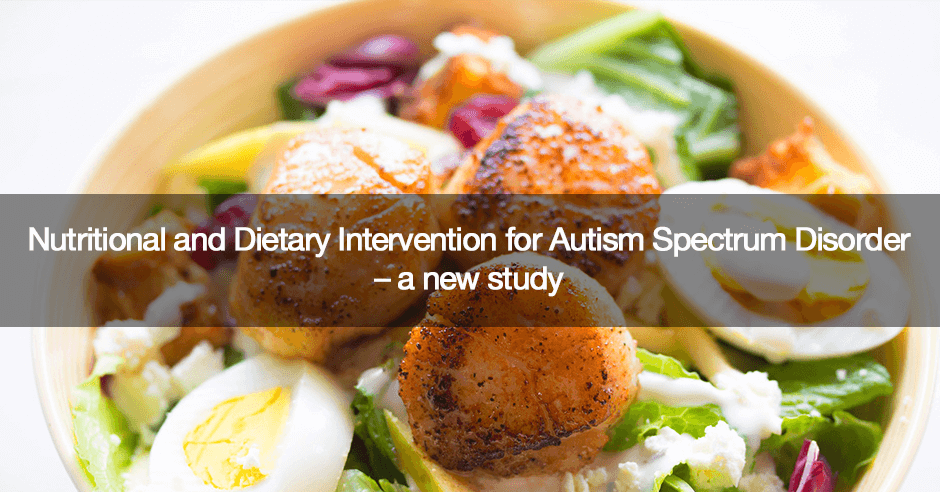
The research confirms how effective nutritional psychiatry is for anxiety and depression (the SMILEs diet depression trial) so when a 12 month randomized trial reports the benefits of nutrition for autism spectrum disorder (ASD) we celebrate this too. Many of the same mechanisms that contribute to anxiety, can also play a role when it comes to ASD – such as food sensitivities, poor gut health, heavy metals, fatty acid imbalances and so on. Also, many children with ASD experience anxiety – 34 to 47% depending on whether you ask a parent of a teacher. Many adults with autism and Asperger’s syndrome also experience anxiety and overwhelm too. In one study 50% of adults with ASD experienced social anxiety.
This paper was published in March this year: Comprehensive Nutritional and Dietary Intervention for Autism Spectrum Disorder-A Randomized, Controlled 12-Month Trial and was
a randomized, controlled, single-blind 12-month treatment study of a comprehensive nutritional and dietary intervention.
Treatment began with a special vitamin/mineral supplement, and additional treatments were added sequentially, including essential fatty acids, Epsom salt baths, carnitine, digestive enzymes, and a healthy gluten-free, casein-free, soy-free (HGCSF) diet.
Here is the year-long protocol for the study participants:
Day 0: Vitamin/Mineral supplementation begins.
Day 30: Essential Fatty Acid supplementation begins.
Day 60: Epsom salt baths begin.
Day 90: Carnitine Supplementation begins.
Day 180: Digestive Enzyme supplementation begins.
Day 210: Healthy, casein-free, gluten-free diet begins.
Day 365: Final assessment of autism severity and overall functioning status. Final blood draw and urine collection.
And these are the guidelines for the dietary changes for the study participants:
- Adequate intake of a variety of vegetables (including leafy greens) and fruit (preferably whole fruit).
- Adequate protein quality and intake.
- Adequate, but not excessive, caloric intake.
- Minimal consumption of “junk” foods and replacement with healthy snacks.
- Healthy, gluten-free, casein-free, and soy-free (HGCSF).
- Avoidance of artificial flavors, colors, and preservatives.
Parents of participants reported that the vitamin/mineral supplements, essential fatty acids, and HGCSF diet were the most beneficial. And when asked at the end of the study which treatments they planned to continue at the conclusion of the study, over 85% of parents said the vitamin/mineral supplement and the essential fatty acids were the most likely to be continued, 70% planned to continue the Epsom salt baths, 63% planned to continue the healthy HGCSF diet, and 44% planned to continue using the carnitine and digestive enzymes.
I’m really pleased that they mentioned the following limitation because we really do need to address the nutritional needs of each person:
all participants received all treatments, whereas probably only a subset are likely to benefit from any single intervention (for example, only participants with low carnitine are likely to benefit from carnitine supplementation)…. future studies could try to determine which treatments were most beneficial, using the results of this study to guide those future studies.
Despite the above study limitation, the treatment group saw the following improvements:
- Improved nonverbal intellectual ability
- Significantly greater improvement in autismsymptoms and developmental age
- Significantly greater increases in EPA, DHA, carnitine, and vitamins A, B2, B5, B6, B12, folic acid, and coenzyme Q10
Many of the study participants saw improved communication skills as well as improved daily living skills and social skills – all of which can lead to reduced anxiety and social anxiety, and improved overall happiness.
The authors do mention that the combination of all of the above treatments is feasible for most families and that there were minimal adverse effects. They conclude that:
The positive results of this study suggest that a comprehensive nutritional and dietary intervention is effective at improving nutritional status, non-verbal IQ, autism symptoms, and other symptoms in most individuals with ASD [both children and adults].
Julie Matthews, one of the nutritionists supporting the study
My good friend and colleague, Julie Matthews, was one of the nutritionists supporting the study and is one of the co-authors on the paper. I’m so proud of her contribution to this research which further supports prior studies and the work she does clinically.

Julie is the author of Nourishing Hope for Autism: Nutrition and Diet Guide for Healing Our Children and the founder of the Bioindividual Nutrition Institute. She is hosting the Nourishing Hope for Autism Summit running July 30 to August 30 and she interviews lead researcher, James Adams, PhD, Director of the Autism/Asperger’s Research Program at Arizona State University. The interview is titled “The Scientific Evidence Linking Nutrition and Autism Improvement” so be sure to tune in if you’d like more information on this study and other dietary and nutritional interventions for ASD. (You can register here).
Shamus diagnosed with moderate to severe autism at age 2
Julie shares Shamus’ success story on her Nourishing Hope blog. He was diagnosed with moderate to severe autism at age 2.
When they began him on nutritional and biomedical protocols, his parents had no expectation of improved speech or ever “mainstreaming” their son. They just wanted him to sleep so they could cope with him being autistic.
Within 3 days of starting a gluten and casein-free (GFCF) diet his projectile vomiting stopped and his meltdowns reduced from 20 per day to just 3. The next step was the GAPS diet (Gut and Psychology Syndrome) which included broths and fermented foods, and did lead to worsening symptoms for a short time. Later on overgrowth of the harmful bacteria Clostridium difficile was addressed and other biomedical/nutritional interventions were included.
Today at age 10, Shamus shows no signs of autism and has been classified as “fully recovered!” He’s in a mainstream classroom at school, his teachers love him and he has a great group of friends. Shamus is great at team sports, and exhibits no problems in the classroom whatsoever.
I’m horrified that the doctor told this mom that she was over-anxious, had post-natal depression and needed to take an antidepressant (but that’s another entire blog post).
Both children and adults benefit from dietary changes
I find it very encouraging that the study participants were both children and adults with autism spectrum disorder and their ages ranged from 3 years to 58 years. Julie shares this inspiring and hopeful comment in the press release:
The study also shows that no matter the age of the individual with autism, diet and nutrition intervention can help. It’s never too late to be nourishing hope!
I agree, it’s never too late to make changes. This wonderful success story about an older gentleman with autism is just one example. Carolyn Gammicchia, mom/wife/autism advocate/ disability activist, shared the following on Facebook shortly after the study was published:
I have spoken to many people across the country who implemented this in older individuals, one man was 51 from TX who had been institutionalized and had not spoken. He was in very poor health when a wonderful lady took him in and somehow got my number and called me. She had seen a presentation I had done about five years ago about this and she weaned him off multiple medications, cleaned up his diet (went GFCFSF i.e. gluten-free, casein-free and soy-free) and supplemented with vitamins and minerals, plus exercise. He started speaking, lost 50 lbs, and is able to work now. It works!
Diet reduces anxiety and depression and helps with bipolar and schizoaffective disorder too
I mentioned nutritional psychiatry at the start so here are a few blog posts that highlight how diet reduces anxiety and depression and helps with bipolar and schizoaffective disorder too.
- Ketogenic diet: reductions in auditory hallucinations and delusions, better mood and energy, and weight loss
- Bipolar, disruptive mood or gluten and junk food?
- Paleo and grain free diets: anxiety and depression success stories
Going back to the study limitation – what this all means is finding the right combination of dietary and nutritional interventions for each person. There is no one-size fits all and bioindividualized nutrition is key – for ASD, anxiety, depression and any other condition.
We’d love to hear what dietary interventions you’ve used with success with a loved one with autism or Asperger’s syndrome. Have these changes also reduced anxiety and improved other mood symptoms?
If you’re a practitioner, feel free to share a success story about one of your clients/patients with ASD.
Do also share some tips that you have found make this dietary transition easier and some challenges you have faced. Feel free to post your questions too.
Hi very interested in this approach to autism . Do you have any recommendations for doctors or practioners that can gelp with a protocol on nutrition thats based in melbourne , victoria , australia?
Thankyou
Personally I have to recommend any trained in the Walsh protocols by the Walsh Research Institute. My own successful treatments from this were primarily for Mental Health issues but they have also addressed what looks very much like concurrent previously undiagnosed ASD issues. Brain disorders like these all seem to have very similar root features in complex expressions.
https://eaglecommunitycare.com/2018/02/22/some-things-can-do-with-a-little-fixing-after-all/
Mary
I’d look for a functional medicine practitioner or naturopath who has experience working with autism. A good nutritionist will be able to help too.